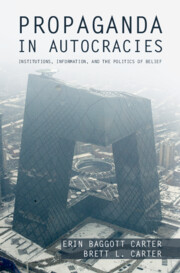Book contents
- Frontmatter
- Dedication
- Epigraph
- Contents
- Figures
- Tables
- Acknowledgments
- Part I Foundations
- 1 Persuasion and Domination
- 2 A Theory of Autocratic Propaganda
- 3 A Global Dataset of Autocratic Propaganda
- Part II The Political Origins of Propaganda Strategies
- 4 The Politics of Pro-regime Propaganda
- 5 Narrating the Domestic
- 6 Narrating the World
- 7 Threatening Citizens with Repression
- Part III The Propaganda Calendar
- 8 The Propagandist’s Dilemma
- 9 Memory and Forgetting
- Part IV Propaganda, Protest, and the Future
- 10 Propaganda and Protest
- 11 Conclusion
- References
- Index
- Other books in the series
11 - Conclusion
Published online by Cambridge University Press: 18 July 2023
- Frontmatter
- Dedication
- Epigraph
- Contents
- Figures
- Tables
- Acknowledgments
- Part I Foundations
- 1 Persuasion and Domination
- 2 A Theory of Autocratic Propaganda
- 3 A Global Dataset of Autocratic Propaganda
- Part II The Political Origins of Propaganda Strategies
- 4 The Politics of Pro-regime Propaganda
- 5 Narrating the Domestic
- 6 Narrating the World
- 7 Threatening Citizens with Repression
- Part III The Propaganda Calendar
- 8 The Propagandist’s Dilemma
- 9 Memory and Forgetting
- Part IV Propaganda, Protest, and the Future
- 10 Propaganda and Protest
- 11 Conclusion
- References
- Index
- Other books in the series
Summary
Our theory treats nominally democratic institutions as constraints that autocrats struggle to loosen and citizens’ beliefs as the central battlefield on which the struggle for political change is waged. After reviewing the book’s key findings, in this chapter we use our theoretical framework to suggest a series of important questions about autocratic politics in the early twenty-first century. We explore how the world’s autocrats are attempting to shape their citizens’ beliefs by weaponizing distinctly modern technologies, not just propaganda and censorship. We also discuss how the world’s autocrats are attempting to loosen the electoral constraints that bind them. Although this book is about propaganda in autocracies, it has important implications for politics in democracies, especially as a series of “populist-authoritarian” leaders take power across Europe and North America. We argue, in particular, that Xi Jinping’s propaganda strategy helps us understand the process of democratic erosion underway across the world. We conclude by discussing the book’s implications for public policy.
Keywords
- Type
- Chapter
- Information
- Propaganda in AutocraciesInstitutions, Information, and the Politics of Belief, pp. 443 - 466Publisher: Cambridge University PressPrint publication year: 2023

